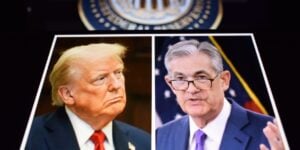Economists run a strange thought experiment anytime we consider fundamental questions like “Where does money come from?” It is not the type of thing normal people do every day. To get a better sense of what economists are doing and how that experiment contributes to our knowledge, I will argue by analogy that money is a social contract.
By social contract, I do not mean that every person in society gathered in a single room and signed a paper committing them to using money. I mean that economists think about money like we and philosophers think about social contracts, as the term is used in social contract theory.
What is social contract theory? Social contract theory started with the work of Thomas Hobbes and was revived in the 1970s by John Rawls. These philosophers consider a hypothetical situation (state of nature for Hobbes, and behind the veil of ignorance for Rawls) in which people in a society come together and collectively agree to some social institution. For Hobbes, people would agree to empower Leviathan to avoid the “nasty, brutish, and short” state of nature. For Rawls, people would agree to his two principles of justice.
In a similar way, monetary theorists consider a hypothetical position (a model) where all of society agrees on an outcome. Often, we consider situations in which a few different people have some obstacle to seamlessly trading. To improve their outcomes and realize gains from trade, the people may agree to use money, credit, or something else.
Here is what makes these experiments strange. For both social contract theory and monetary theory, theorists are considering something that never happened in the past and that they have no reason to believe will happen in the future. If the situation does not exist in reality, what is the purpose of the social contract thought experiment?
In his first work in social contract theory, The Calculus of Consent (with Gordon Tullock), James Buchanan sees his goal “as lying within the normative side of the science of politics: ‘What set of rules should the fully rational individual, motivated primarily by his own self interest, seek to achieve if he recognizes that the approval of such rules must embody mutual agreement among his fellows?’’”
In normative social contract theorizing, the goal is to figure out which social rules are justified. In normative monetary theorizing, the goal is to find out which monetary rules are efficient. “Justified” and “efficient” are not the same thing, but they are both desirable attributes for any rule or institution. The theorist is searching among the constrained set of possible outcomes to find the best one. Both types of thought experiment are vital for thinking through and ultimately improving our social rules and institutions.
However, there is also a positive (i.e., not normative) element of social contract theory and monetary theory. In my next article, I will show how both approaches give us positive knowledge and tell us something about how the world operates.





